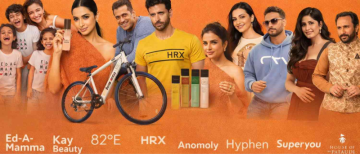A Clash of Two Cinematic Narratives
Film has long served as a mirror to society, but in our current digital age, it has transformed into a stage for ideological conflict. The premieres of Animal and Mrs have sparked fervent discussions online, revealing starkly different audience reactions to themes of masculinity and femininity. Animal, featuring a hyper-masculine lead, has been widely celebrated, while Mrs, which showcases a woman's journey toward independence, has faced criticism as being merely pseudo-feminist from certain viewers. This disparity prompts a crucial inquiry—what drives such divergent responses to these stories?
Animal: An Ode to Hyper-Masculinity
Sandeep Reddy Vanga’s Animal, with Ranbir Kapoor in the lead role, has resonated powerfully with many viewers. For some, the film’s intense, violent narrative felt raw and unfiltered, providing a sense of emotional release. The portrayal of a man expressing his pain through aggression struck a chord, particularly among those who have long admired strong, assertive male characters in film.
The film has sparked significant debate, particularly regarding its portrayal of toxic masculinity, which many found troubling. Critics highlighted that the female characters seemed to exist solely to enhance the male protagonist's journey, a recurring issue in Bollywood narratives.
In response to these critiques, fans of Animal were quick to defend the film, suggesting that the critics were being overly sensitive or attempting to impose feminist viewpoints on what they viewed as a deeply personal narrative.
Mrs: The Challenge to Feminist Perspectives

Conversely, Mrs, featuring Sanya Malhotra, presents a compelling narrative of a woman confronting societal norms and asserting her individuality. It embodies a story of subtle defiance, emphasising the importance of self-empowerment in a society that often pressures women to make sacrifices.
Despite its genuine storytelling, Mrs quickly faced significant online criticism rather than widespread acclaim. Some users on social media accused the film of promoting an agenda, labeling it as another instance of pseudo-feminism. Others rejected it as an unrealistic depiction of womanhood, contending that feminist narratives in film are only acceptable when they adhere to specific boundaries.
Who Determines the Limits of Feminism?
This raises a crucial question: who has the authority to define when feminism has exceeded acceptable limits? Many profess support for women's rights, yet when a film like Mrs confronts established gender norms, it is quickly labeled as overreaching.
The reality is that feminism in film should not be about quantifying excess. It is about sharing narratives that have been overlooked for too long. If men can express their anger, struggles, and vulnerabilities without facing criticism, why should a woman's path to self-discovery be treated any differently?
The differing responses to Animal and Mrs reveal a profound bias. A film centered on male aggression is readily embraced, while a film focused on female empowerment faces ongoing scrutiny and claims of being excessive.
The Surge of Online Misogyny

This disparity extends beyond just two films; it reflects a broader trend where online environments have turned increasingly unwelcoming to feminist perspectives. Social media, once a platform for promoting progressive ideas, is now rife with reactionary views that trivialise feminism as unwarranted or overstated.
The phrase pseudo-feminism is frequently wielded to stifle discussions about gender equality. However, the truth remains that women continue to struggle for fundamental rights, whether in the workplace, at home, or in the narratives portrayed on screen.
The Importance of a More Nuanced Dialogue
The discussion surrounding Animal and Mrs transcends mere box office performance or social media buzz. It fundamentally concerns our societal perceptions of gender in narratives. If viewers can support a film like Animal without scrutinising its underlying messages, then feminist narratives like Mrs deserve the same opportunity to thrive without being labeled as superfluous or extreme. There is no definitive standard for the acceptable level of feminism in film. What truly matters is ensuring that every voice, every story, and every viewpoint receives equitable consideration. Rather than stifling conversations, we should foster a more balanced and inclusive dialogue regarding gender representation in Indian cinema.
With inputs from agencies
Image Source: Multiple agencies
*The views expressed are personal to the author and do not reflect the platform's opinion of the same.
© Copyright 2024. All Rights Reserved Powered by Vygr Media.
Author's profile:
Arhan Ali is a sharp observer of economic and political currents, known for blending keen analysis with a dash of wit. Whether dissecting global trade wars or taking a playful jab at social absurdities, his writing strikes the perfect balance between intellect and irreverence.


























